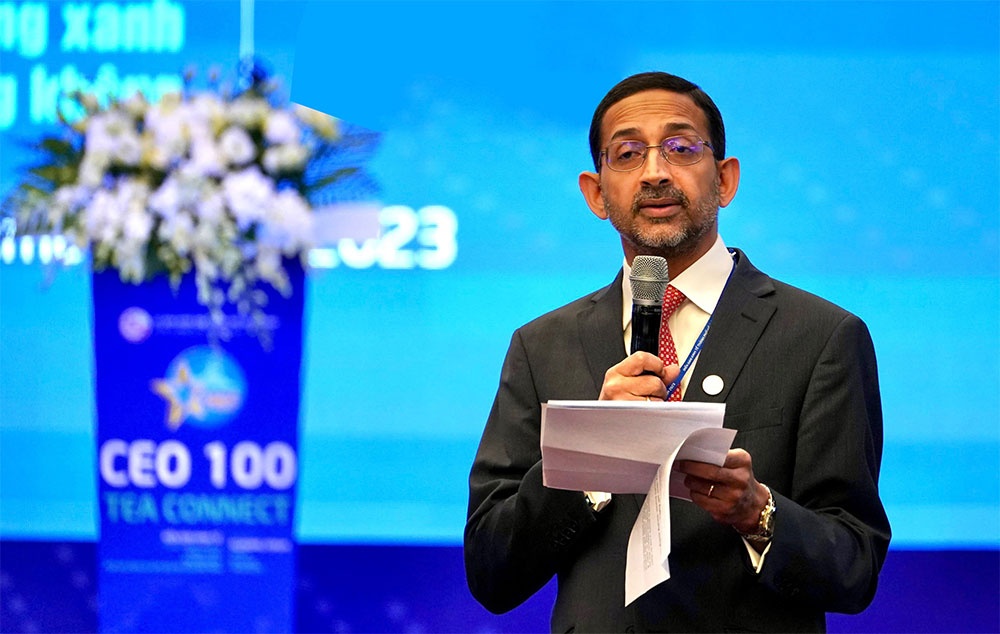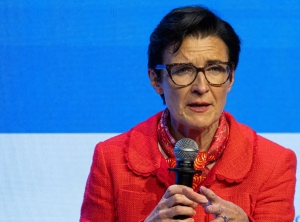Carbon market to scale investment required for climate finance
The government is, as a result, working on regulations for the development of Vietnam’s carbon market, including regulations on carbon credit management, quota exchange activities, and the operation of carbon credit trading floors. Connecting the local carbon market with the regional and global markets is also a key focus.
 |
| Vietnam Citi country officer discussed green finance at CEO 100 Tea Connect 2023 in Ho Chi Minh City |
According to the Statistical Yearbook 2019, Vietnam has almost 15 million hectares of forest, and protecting and restoring tropical forests could play an important role in the emissions reductions needed to stave off global warming.
Thus, Vietnam’s forestry sector could generate revenue from the market for carbon credits. It would require finding ways to protect the forest, to reduce deforestation, and planting more trees to increase forest acreage.
Carbon markets have increasingly been seen as part of the solution to climate change. They have mostly been dominated by the private sector, but this will soon change. More than two-thirds of countries are planning to use carbon markets to meet their climate commitments.
According to a 2023 Citi report, the voluntary carbon market is currently valued at approximately $2 billion. This market is needed as it is difficult for certain companies, especially those in hard-to-abate sectors, to reach net-zero without investing in carbon credits.
Collectively, the sectors of steel, cement, aviation, shipping, and road freight account for a quarter of today’s global carbon emissions, but this has the potential to rise by 50 per cent through to 2050, given the growth expectations.
Hard-to-abate sectors are not the only ones requiring carbon credits. In the limited time available, it is inherently difficult to reach net-zero across many sectors, especially regarding Scope 3 emissions. Companies still need to reduce their emissions and invest in low-carbon solutions – both investors and the general public demand that this occurs, and many companies are working hard to achieve this.
To support the net-zero ambitions of clients, Citi closed the very first voluntary carbon credit (VCC) transaction in May 2022. Base Carbon Capital Partners Corporation facilitated the development of a cookstove and water purifier carbon reduction project in Vietnam, with Sustainability Investment Promotion and Development JSC as in-country project developer. Citigroup Global Markets Ltd. acted as the carbon credit offtaker to the company for the project.
The project is expected to generate approximately 26.6 million VCCs over an estimated 10-year period from the distribution of approximately 850,000 cookstoves and 364,000 water purifiers to participating households in Vietnam. The transaction is a first for Citi within an exponentially growing market, and puts the bank at the forefront of the carbon credit market.
 |
| Finance is being used to support people low-income areas through cleaner drinking and cooking methods |
This transaction is expected to support five million people living in low-income households where cookstoves and water purifiers will be given to them for free and access provided to clean drinking water and cleaner methods of cooking, significantly reducing the emissions.
Previously, the open fire cooking method was used, which is unhealthy and environmentally unfriendly.
Following this transaction, Citi facilitated the World Bank’s five-year principal protected emission reduction-linked bond of $50 million in February 2023, which provides investors a return linked to the issuance of VCCs expected to be produced by a project in Vietnam. The project aims to manufacture 300,000 water purifiers and distribute them to approximately 8,000 schools and institutions up and down the country.
It is also expected to make clean water available to around two million children and to cut almost three million tonnes of carbon dioxide over the five years in question. The bond is an outcome-based financial instrument that mobilises private capital to support the financing of a project with positive climate and development impacts – with outcomes measured by the generation of VCCs. This marked a first-of-its-kind innovative structure which also attracted landmark investors to participate in the transaction, and one which is replicable and can be scaled further to channel more private capital for developmental and climate related activities.
 |
These VCC transactions demonstrate Citi’s ability to innovate and tap into the growing carbon credit market.
The world is in a race against time, as it needs to reduce emissions by 45 per cent from 1990 levels by 2030 to have any chance of limiting a temperature increase to a 1.5 degree Celsius rise. There is currently a $1.7 trillion investment gap that needs to be closed to limit the negative impacts of climate change on both people and the planet.
As the public sector does not have the fiscal capacity to reach this investment figure alone, 70 per cent of all climate finance needed must come from the private sector.
Regionally, and globally, many companies have chosen to reduce their emissions voluntarily, either by investing in new technologies or the use of carbon credits. The carbon markets have been able to provide a bridge for meeting the rising demands.
With a boom in demand for carbon credits over the past couple of years, Vietnam has several opportunities to develop the carbon market. Domestic businesses could create high quality carbon credits and sell them regionally and globally, helping international companies cover their carbon credit commitments.
Citi is pioneering the carbon market in Vietnam, and it is implementing transactions that can serve as a model for replication to support other carbon credit generating projects. These transactions contribute to the MoU launched between Citi and the Vietnamese government in 2022 and is a testament to the excellent opportunities for carbon credit projects in Vietnam and Citi’s ability to support this sector.
 | Citi wins 2023 Asiamoney’s Best International Bank in Vietnam Citi Vietnam has been recognised as the Best International Bank in Vietnam in the 2023 Asiamoney Awards. |
 | Citi CEO speaks of 'monumental shift' in global trade The Asia-Pacific Economic Cooperation (APEC) intergovernmental forum brings together 21 economies from around the Asia-Pacific region to collaborate on the shared goal of creating a more open, resilient, sustainable, and peaceful future for the people of the world’s most dynamic region. |
What the stars mean:
★ Poor ★ ★ Promising ★★★ Good ★★★★ Very good ★★★★★ Exceptional
Related Contents
Latest News
More News
- Private capital funds as cornerstone of IFC plans (February 20, 2026 | 14:38)
- Priorities for building credibility and momentum within Vietnamese IFCs (February 20, 2026 | 14:29)
- How Hong Kong can bridge critical financial centre gaps (February 20, 2026 | 14:22)
- All global experiences useful for Vietnam’s international financial hub (February 20, 2026 | 14:16)
- Raised ties reaffirm strategic trust (February 20, 2026 | 14:06)
- Sustained growth can translate into income gains (February 19, 2026 | 18:55)
- The vision to maintain a stable monetary policy (February 19, 2026 | 08:50)
- Banking sector faces data governance hurdles in AI transition (February 19, 2026 | 08:00)
- AI leading to shift in banking roles (February 18, 2026 | 19:54)
- Digital banking enters season of transformation (February 16, 2026 | 09:00)

 Tag:
Tag:



















 Mobile Version
Mobile Version